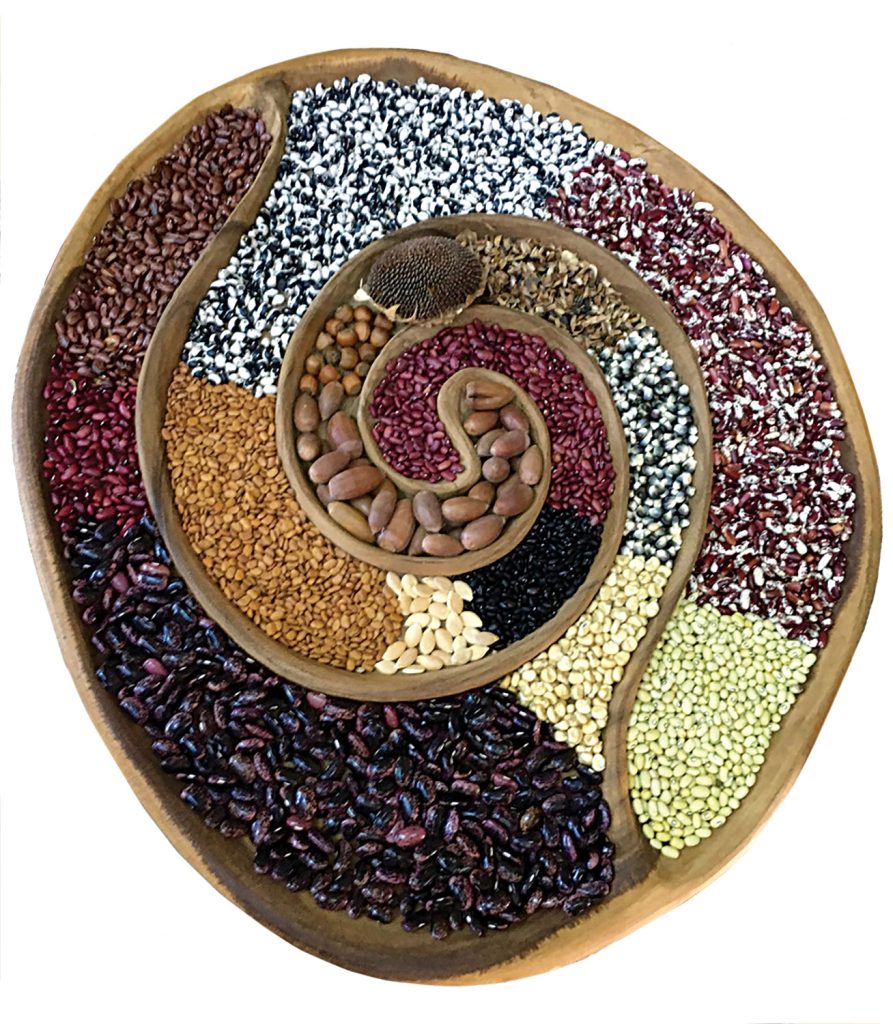Beneath the October harvest moon, the sharp sickle of autumn has laid bare the field stubble at our local community college organic farm in Novato, California. We have gathered here in the bounty of the Three Sisters garden under the guidance of the Cultural Conservancy, a nonprofit indigenous rights organization that protects the traditional knowledge and practices of native cultures through a variety of programs. One of these, Native Foodways, revitalizes the plant species and practices, songs, and stories that accompany crop planting and harvest. My farmer husband and I have been working with the Cultural Conservancy for the past six years.
This year, the harvest was abundant beyond measure. At season’s end, on the margin of the field, full mounds of Taos blue hubbard squash and Lakota winter squash cured in the autumn wind. Ripe ears of Oneo, the heritage white flint corn of the Iroquois Confederacy, were hung to dry for winter storage, their husks folded back and braided into thick ropes. A portion of this corn harvest was ground and roasted into fragrant cornmeal and served as a traditional cornbread for the annual feast. In the center of our gathering circle, seven varieties of richly patterned Native American heirloom beans were arranged on a large wooden-spiral offering tray. The remainder of the bean harvest was sorted into deep buckets for distribution as seed and food to the extended Bay Area intertribal community.
This honorable harvest was celebrated with prayer and blessing, and convened by young Mohawk Seed Keeper Rowan White, who led us in the traditional Haudenosaunee (Iroquois) Thanksgiving Address of the Six Nations Confederacy:
Greetings and thanksgiving to the many supporters of our lives! The Original Instructions direct that we who walk about on earth are to express a great respect, affection, and gratitude toward all the spirits which create and support life.
In the grandeur of the Three Sisters harvest we summoned gratitude for the kinship represented by the Native Foodways crops. During this unsettled year of natural disaster and violent political upheaval, fire, flood, earthquake, and famine have devastated the landscapes of our world. From Bangladesh, Oaxaca, and Myanmar to coastal Florida and Puerto Rico the effect of global climate disruption is acute. Dharma friends at the Houston Zen Center continue to assist flood victims still suffering from the devastation of Hurricane Harvey. In nine states of the Pacific Northwest and Intermountain Region, more than 80 wild fires burn, darkening the midday skies. Our daughter in Portland, Oregon, reports that during the Eagle Creek fire that devastated the Columbia River gorge, parts of the region were covered with a thin blanket of pale gray ash.
In dire times, real hunger and thirst rise. Blessedly, so does resilient engagement and dedicated dharma. Last month, practitioners from the San Francisco Zen Center joined hundreds of citizens across the country for a day of compassionate action and a walk to feed the hungry, sponsored by Buddhist Global Relief, an organization founded by Buddhist scholar-monk Bhikkhu Bodhi. The mission of Buddhist Global Relief is to provide direct food aid to people affected by hunger and malnutrition, to promote ecologically sustainable agriculture, and to support the education and right livelihood projects of girls and women worldwide.
With insightful clarity, Bhikkhu Bodhi reminds us that the most fragile link between accelerating climate change and natural disaster is neither flood nor fire but a diminished food supply and malignant injustice in our economic and political systems. Although the Buddha taught that the gift of food is the gift of life, 900 million people, one-sixth of the world’s population, suffer from food shortage while 5 million children die annually from poverty and hunger.
Without turning away from this truth, and grateful for embodied Zen practice, I sat alone after our harvest festival at the roots of the giant Coast Live Oak where we had celebrated our Three Sisters ceremony. Darkness spread from the edge of the empty field inward. At the waning of the season, I felt the old spirit of Thanksgiving move in the shadows.
In the original teachings of the Buddha, followers of the Way were reminded that the dharma is hard to see, difficult to awaken to, quiet and excellent, as well as not confined by thought, subtle, and sensed by the wise. In an ecosystem of dharma awareness a spiral of gratitude radiates out, grounded in the wisdom teachings and compassion of heart and mind.
Genuine gratitude thrives and grows when three essential gifts are cultivated. First, the gift of material support and the nourishment of real food. Next, the gift of authentic dharma teaching, designed to uphold and support practice that refuses to abandon the truth of suffering. And finally, the gift of non-fear, radical and deep-rooted.
In the shelter of the grandmother oak, I imagine fearless bodhisattvas, ecosattvas, coming up now out of split open ground. Their continuous practice is generated from prajnaparamita, the perfection of wisdom. Emerging from this matrix, bodhisattvas find no obstacle for their minds. Having no obstacles, they overcome all fear, and lifetime after lifetime they arise, food and dharma nourishment for a hungry world.
Thank you for subscribing to Tricycle! As a nonprofit, we depend on readers like you to keep Buddhist teachings and practices widely available.
